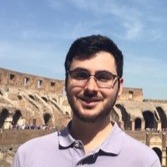
Samuel K
- Research Program Mentor
PhD at University of Maryland, Baltimore
Expertise
neuroscience with a focus on neural systems, pain, and pharmacology
Bio
I am a postdoctoral research fellow at the Washington University in St. Louis, where I research neural networks with the long-term goal of advancing precision medicine. When I started college I was interested in becoming a clinical psychologist, but I quickly fell in love with neuroscience when we learned about famous neurology patients that have helped to shape how we understand the brain. I pursued this interest in neuroscience through a PhD program at University of Maryland where I focused on using multivariate statistics to better understand individual variability in migraine patients. Through every step of my training my love of science has grown, and I am excited to share this passion with young scholars. I have some obsessive qualities and enjoy finding a new major hobby every 3-5 years. During graduate school I learned how to make french pâtisserie at home. While I still bake, my main hobby now is making coffee. I try to have a constant stream of entertainment from video games, cinema, books, and anime. I primarily read science fiction and have lately been reading Chinese science fiction (e.g. 3 body problem), but I also enjoy reading non-fiction especially about history.Project ideas
Critical evaluation of testosterone supplements in men
I am a neuroscientist and can offer expertise in neuroscience, biology, chemistry, statistics, and psychology. The most critical skill for any scientist is to be able to critically evaluate primary literature. Developing a critical eye for good research takes time, but it can be facilitated by reading articles with a mentor. I would like to work with a student to develop a research question that they are interested in. An example would be critically evaluating the scientific support for testosterone supplements in men. For this, we would first learn about basic information on how testosterone impacts cell signaling pathways. Then I would help teach the student how to seek out literature. This is a critical life-long skill that very few people outside of academia possess. After we have identified literature, we would then work through reading articles together to learn how to identify a hypothesis and to examine how well the experiments actually test the hypothesis. Based on the readings, the student would produce a scientific literature review that addresses empirical support for testosterone supplements, and what research gaps need to be filled.
Individual reliability of personality tests
Personality tests have formed a major area of research within psychology. Critical to personality test validity is that they are stable within a person, thereby measuring a person's trait instead of the current emotional state. A research topic would be to administer common personality tests to members of your community multiple times. I would work with the student to then calculate reliability measures, where we would go over basic coding, statistical analysis and graphing n R. The student would then summarize the results in a research article. Alternative research projects that allow for actual data collection would be testing for measurement reliability in personality tests. This is a nice project as it is feasible for people to do without lab equipment.